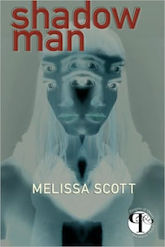Originally published by Tor Books in 1995, and co-winner of the 1996 Lambda Literary Award for Gay/Lesbian Science Fiction (with Nicola Griffith’s Slow River), Shadow Man was reissued in 2009 by Lethe Press. It’s taken me a few years to get around to reading it, which I rather regret—Shadow Man is a fascinating work of social science fiction, and an excellent novel with an ambitious approach to the social issues that it concerns itself with; an approach that still feels novel nearly 25 years on.
In the future, the drugs that permit people to survive superluminary travel have had long-term effects on humanity. Humans have developed five distinct genders, which are recognised on a majority of inhabited planets. But on Hara, a traditional and conservative world, only male and female genders are legal. The “odd-bodied,” those whose genders don’t fit into one of these two categories, must adopt and live as only one—though they are permitted to change the legal status of their gender from male to female, if, for example, they want to marry a person who is not odd-bodied and is not of a different legal gender.
Warreven Stiller is an intersex person on Hara. He’s legally a man, but he’s both odd-bodied and what the Harans call “wry-abed”—attracted to people who share his legal gender, which on Hara is rather looked down on. He’s a legal advocate for people on the margins of Haran society. The presence of the Galactic Concord on Hara in the form of trading interests has given rise to a much-denigrated subculture of “trade”—sexual exchange for favours or cash—between Harans and Galactic citizens, which is seen as rather kinky on both sides, since they have very different cultural approaches.
Mhyre Tatian is a manager for a trading concern on Hara, dealing in pharmaceuticals. He gets involved with Warreven by accident, and then both Mhyre and Warreven find themselves in the middle of a clash between the traditional forces in Haran society and a movement among the reform-minded (and the odd-bodied, and the wry-abed) to overturn Hara’s strict gender binary.
Buy the Book


Shadow Man
This is a compelling novel with fascinating worldbuilding. In some ways, it shows its age—the Concord doesn’t really seem to have a place for people whose gender identities don’t fit their bodies, even if it allows a wider range of bodies to be recognised as distinct in gender from each other—but in other ways, it remains fresh and new. Particularly in its approach to social revolution: Warreven fights for change on Hara, but ultimately fails to achieve tangible change in for himself. But he opens up a symbolic space, a naming—as it were—of things and of people, even though the authorities ultimately drive him off-planet. (The end of the novel leaves space open for him to return.)
This approach to social revolution—the opening-up of symbolic space, the gaining of semantic ground and ground in people’s consciousness by naming things and by standing up and repurposing symbols that had stood for other things in order to allow people to see matters in a different light; the fact of the revolution’s “failure” or “incompleteness”—is much more realistic than the general run of revolution shown in science fiction and fantasy, where a revolution in institutions and attitudes is often accomplished all in one go. The “great man” (or person) theory of change—the idea that one extraordinary person is all it takes to bring about great changes—is alive and well in SFF, and Shadow Man is a strong rebuke to it.
As well as being a fascinating novel filled with compelling characters. It’s a really enjoyable book. I liked it a lot.
Liz Bourke is a cranky queer person who reads books. She holds a Ph.D in Classics from Trinity College, Dublin. Her first book, Sleeping With Monsters, a collection of reviews and criticism, was published in 2017 by Aqueduct Press. It was a finalist for the 2018 Locus Awards and is nominated for a Hugo Award in Best Related Work. Find her at her blog, where she’s been known to talk about even more books thanks to her Patreon supporters. Or find her at her Twitter. She supports the work of the Irish Refugee Council and the Abortion Rights Campaign.










